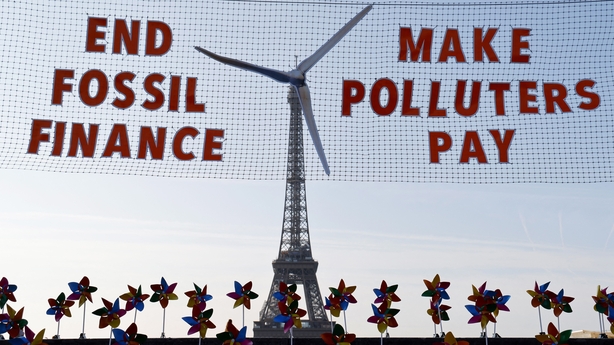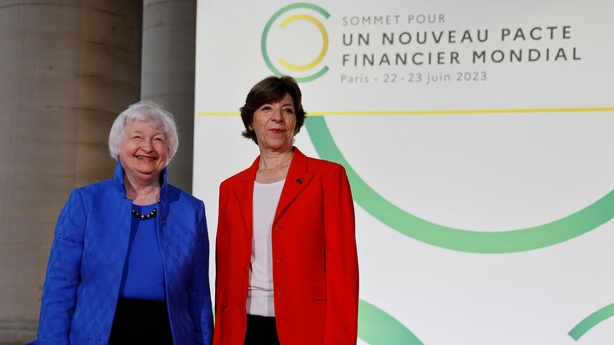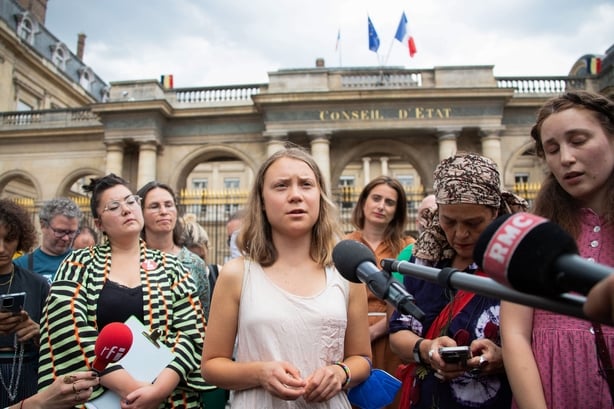The World Bank will ease financing for countries hit by natural disasters, it has confirmed, as the International Monetary Fund said it had hit its target of making more than €90 billion in special drawing rights available for vulnerable nations.
The two announcements were made at a gathering in Paris of some 40 leaders, including about a dozen from Africa, China's prime minister and Brazil's president, that aims to give impetus to a new global finance agenda.
The Summit for a New Global Financial Pact seeks to boost crisis financing for low-income states and ease their debt burdens, reform post-war financial systems and free up funds to tackle climate change by getting top-level consensus on how to promote a number of initiatives struggling in bodies such as the G20, COP, IMF-World Bank and United Nations.
At the gathering, Zambia secured a deal to restructure around €5.5bn in debts owed to other governments, according to a French official, in a long-awaited breakthrough to ease pressure on the southern African country's strained public finances.
"It is clear that the international financial architecture has failed in its mission to provide a global safety net for developing countries," United Nations Secretary General Antonio Guterres said, describing the system as outdated, dysfunctional and unjust.
Leaders are set to back a push for multilateral development banks such as the World Bank to put more capital at risk to boost lending, according to a draft summit statement.
In remarks to a panel today, new World Bank President Ajay Banga outlined a "toolkit", including offering a pause in debt repayments, giving countries flexibility to redirect funds for emergency response, providing new types of insurance to help development projects and helping governments build advance-emergency systems.
Citing the war in Ukraine, climate crisis, widening disparity and declining progress, leaders said the World Bank and other multilateral financial institutions needed a new vision.
French President Emmanuel Macron, hosting the summit, said it was time to act or trust would be lost.

The gathering aims to create roadmaps for the next 18-24 months, ranging from debt relief to climate finance.
Many of the topics on the agenda take up suggestions from a group of developing countries, led by Barbados Prime Minister Mia Mottley, dubbed the "Bridgetown Initiative".
The coronavirus pandemic pushed many poor countries into debt distress as they were expected to continue servicing their obligations in spite of the massive shock to their finances.
Africa's debt woes are coupled with the dual challenge faced by some of the world's poorest countries of tackling the impacts of climate change while adapting to the green transition.
Wealthy nations have yet to come good on climate finance that they promised as part of a past pledge to mobilise over €90bn per year, a key stumbling block at global climate talks.
Nearly 80 years after the Bretton Woods Agreement created the World Bank and IMF, leaders aim to squeeze more financing from multilateral lenders for the countries that need it most.
IMF Managing Director Kristalina Georgieva told the summit it reached its target of making more than €90bn in special drawing rights available for vulnerable countries.
Rich countries agreed in 2021 to rechannel some of their unused IMF special drawing rights, an international reserve currency, to poor countries.
US Treasury Secretary Janet Yellen, whose country is the World Bank's biggest shareholder, said multilateral development institutions should become more effective in the way they use their funds before more capital was added.

The summit also wants more engagement from the private sector.
A coalition of countries said it would provide €2.5bn to Senegal to help it achieve its target of 40% of installed capacity from renewable energies by 2030, President Macky Sall said.
The agreement with Senegal is the fourth such Just Energy Transition Partnership (JETP) and follows deals with Indonesia, Vietnam and South Africa struck since 2021.
Thunberg says France targeting climate activists
Swedish climate activist Greta Thunberg said that campaigners are being "systemically targeted with repression" in France.
The 20-year-old is in Paris for the summit.
"We are seeing extremely worrying developments where activists all over the world are experiencing increased repressions just for fighting for our present and our future," she said.
"For example, here in France just the other day.
"They are paying the price for defending life and for the right to protest."

Yesterday, the French government shut down the environmental activist group Les Soulevements de la Terre for provoking armed protests or violent actions, a move immediately criticised by the leftist opposition and non-governmental organisations.
The French interior ministry was not immediately available for comment.


